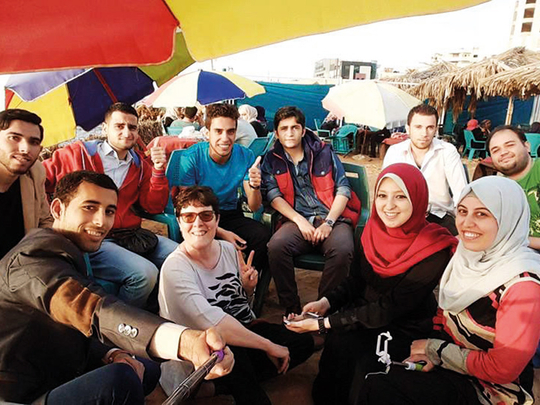
Gaza: A third of the population of the Gaza Strip are youth, yet their voices are rarely heard.
As a result, an increasing number of young Palestinians feel marginalised, with no hope for the future and no motivation to work for positive change.
But, a new project of Euro-Med Monitor for Human Rights called We Are Not Numbers, hopes to change that.
Founded in early 2015, the youth storytelling project was inspired when an American freelance journalist used writing as a form of therapy to help a university student in Gaza work through his pain over the death of his brother during the last Israeli war on Gaza.
She urged the English literature student to write an essay about his brother and share it with others.
“Westerners think of Palestinians, especially those in Gaza, as either helpless victims or terrorists — and usually as numbers,” comments Pam Bailey, the journalist who founded the project and travelled frequently to Gaza until Israel deported and banned her last year.
“Numbers are impersonal, and often numbing. What they don’t convey are the daily personal struggles and triumphs, the tears and the laughter, the aspirations that are so universal that if it weren’t for the context, they would immediately resonate with virtually everyone.”
This is how We Are Not Numbers works: Developing English writers in Gaza and recently also among Palestinians in Lebanon are each assigned a professional mentor — a journalist, author or teacher in a country such as the United States or Australia — who works with them one-on-one to develop their own narrative, tell the stories of others or highlight an issue such as the lack of electricity.
The finished essays are published on the project’s website, shared with a network of progressive media and posted on social media. A book is in the works, and videos are increasingly in the mix as well.
Today, more than 100 youths ranging in age from 16 to 29, have published their stories through the site, and nearly the same number of mentors have signed on.
Among the mentors are Susan Abu Al Hawa, the Palestinian-American author who wrote the novel “Mornings in Jenin” and Miko Peled, an Israeli and author of “The General’s Son” who now speaks out for Palestinians.
About 350 essays have been published to date.
“I joined We Are Not Numbers to leave my print on the world; even after I die, many can still read my stories. Writing is the only thing that stays after one is dead,” says Rawan Abu Asad, a 23-year-old writer and budding filmmaker. Like others in Gaza, the possibility of death in the near future seems very real.
Said Al Yacoubi, a new physician, says, “My experience with the project helped me win a scholarship to further my studies in the UK. They [the reviewers] loved the fact that I share my experiences by writing. It set me apart and showed I have multiple skills.”
For Nora Alashi, 23, writing is healing.
“Enrolling in We Are Not Numbers was a turning point in my life,” she explains. “My first story was about my brother, who died in one of the wars on Gaza. It helped me break my isolation, both by sharing my story and connecting with people abroad.”
The writing published by the project ranges from first-person narratives about living through wars, the longing to travel and coping with the chronic lack of electricity, to profiles of talented artists, to political commentaries.
“Jerusalem has been an imaginary place as long as I’ve lived,” wrote Nedaa Al Abadlah.
“I’ve never been able to actually go there. I want my daughter to know this holy place, to soak up the greatness of its history and its powerful hope for the present and future. I want to hold her hand and walk with her, point with my figure to this and that and behold the look of amazement and passion in her brown eyes at the land to which she belongs.”
Increasingly, writers also report on events in the news, such as the recent clashes that occurred in Lebanon’s Ain Al Helweh refugee camp.
“To me, [being forced to flee the camp after the fighting broke out between the warring parties] was a small imitation of the Nakba in 1948, when my ancestors were forced to leave their homes to make way for the Israeli occupation. The reasons are different, the people are different, the time is different, and I just left for a day. Yet the two cases felt alike in a way,” wrote camp resident Huda Dawood, 21.
“I love writing, but before I got involved in We Are Not Numbers, no one heard my voice other than my close friends,” says Dawood, coordinator of the project in Lebanon. “It is so refreshing to be accepted regardless of political or religious affiliation, and to be given a chance to speak for Palestinian youth. We feel so invisible.”











